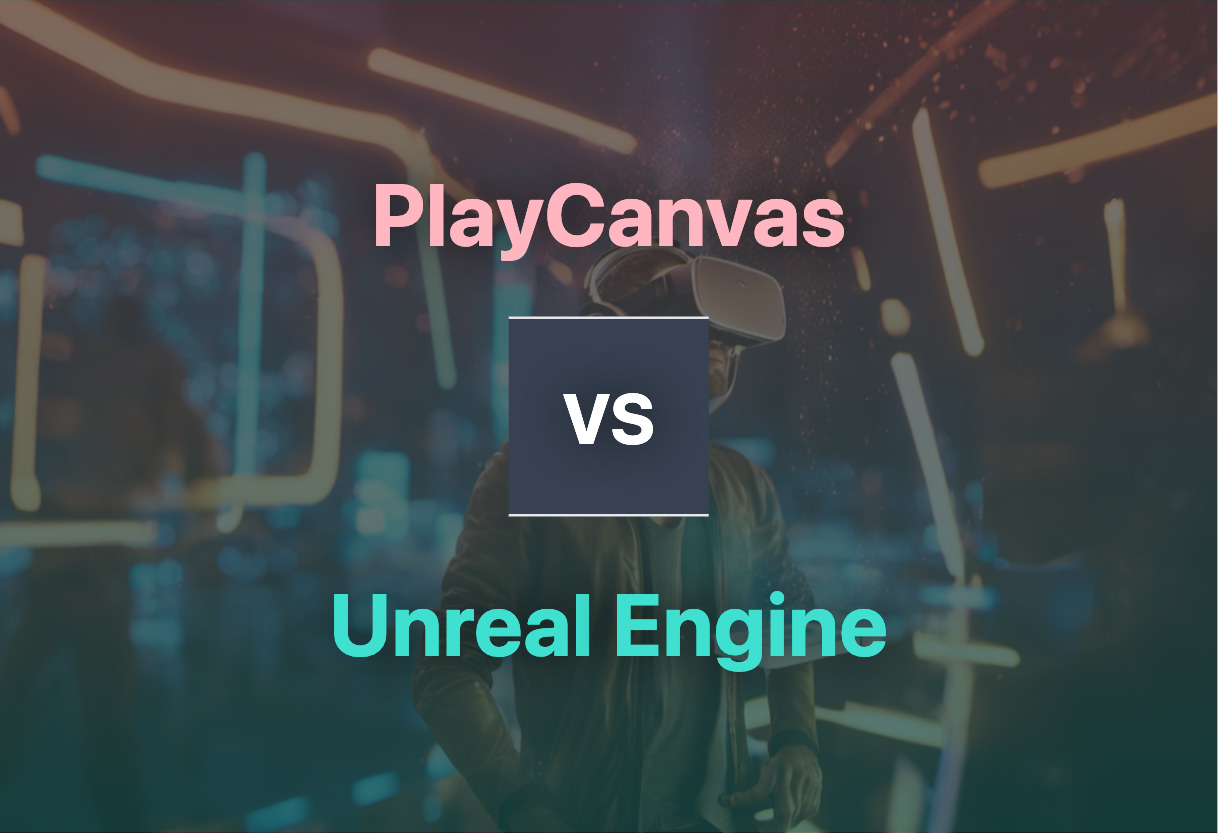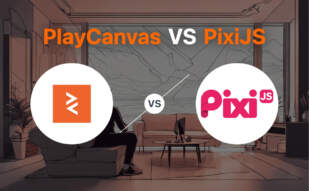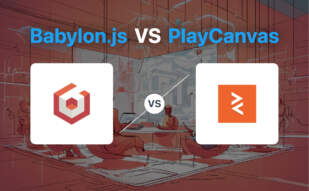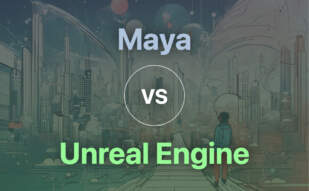For beginners seeking a collaboratively cloud-based, WebGL-supported, and browser-adaptive solution, PlayCanvas excels. Conversely, Unreal Engine stands unchallenged for extensive platform coverage, integrating intricate 3D animations and advanced real-world physics – ideal for veteran coders and large-scale projects.

Key Differences Between PlayCanvas and Unreal Engine
- PlayCanvas utilises JavaScript for scripting, whereas Unreal Engine uses C++.
- PlayCanvas is a cloud-hosted creation platform with real-time collaboration. Unreal Engine lacks integrated real-time collaboration.
- Unreal Engine’s usage comes with royalty charges for commercial projects earning over USD 1 million, whereas PlayCanvas has a free plan along with paid plans.
- While both support desktop and mobile, Unreal Engine extends to consoles and VR.
| Comparison | PlayCanvas | Unreal Engine |
|---|---|---|
| Type | Open-source 3D Game/Interactive 3D Application Engine | 3D Computer Graphics Game Engines |
| Platform | Cloud-hosted creation platform | Desktop, mobile, console, and virtual reality |
| WebGL Support | Yes | No |
| Physics Simulation, 3D Audio, and 3D Animations | Yes | Yes |
| Real-time Editing | Yes | Unrevealed |
| Scripting Language | JavaScript | C++ |
| Distribution Method | URL web link or Native wrappers | Various, depends on platform |
| Cost | Free, Personal and Organisation plans | 5% of revenues over $1 million, free for schools and universities |
| Collaboration Features | Yes | Marketplace for selling creations or purchasing the work of other developers |
What Is PlayCanvas and Who’s It For?
PlayCanvas is an open-source 3D game engine and interactive application platform known for its cloud-hosted creation capabilities. It grants a multi-terrain compatibility range extending to Firefox, Google Chrome, and any other browser that supports WebGL. The platform gained popularity and trust from reputable firms like ARM, Activision, and Mozilla. It’s an ideal tool for online game developers seeking real-time collaboration and data rigor in their 3D projects.
The service is fit for users at various levels, from beginners enjoying the workings of a free plan to advanced developers utilising the organization plan for more complex operations. Notable companies like Disney, Facebook, and Samsung have trusted PlayCanvas for their projects.

Pros of PlayCanvas
- Open-source tool with a cloud-hosted creation platform
- Supports realtime collaboration
- Strong industry support and trust
- Integrated with a version control system
- Supports WebGL 1.0 and 2.0 standard
Cons of PlayCanvas
- Requires account and access token for usage
- Collaborative features might overwhelm new users
What Is Unreal Engine and Who’s It For?
Unreal Engine (UE), originating from Epic Games, is a powerful suite of integrated tools for developers to design and build games, simulations, and visualizations. It has a proven record supporting a vast pool of platforms from desktops and consoles to mobiles and VR systems. Through various versions since its first showcase in 1998, UE integrated new features, adopted support for more platforms, and entertained different pricing models.
UE stands as a companion tool for game developers, film and television content creators, or anyone in need of intensive 3D computer graphics. It has a flexible pricing model, including a free version for education and a percentage revenue fee, offering a lucrative platform for developers to sell or buy creations in the Unreal Engine Marketplace.

Pros of Unreal Engine
- Wide support for different platforms
- Powerful and integrated tool suite
- Flexible pricing models
- Thriving marketplace for developers
- Support for creating iOS games and apps
Cons of Unreal Engine
- A steep learning curve
- Royalties on revenues over USD 1 million
Code Examples for PlayCanvas & Unreal Engine
PlayCanvas: Creating a Floating Cube
In this example, we create a PlayCanvas application that displays a floating cube. The cube constantly rotates and moves up and down as if floating. You need a basic understanding of JavaScript and the PlayCanvas engine to understand this code snippet.
//Floating Cube PlayCanvas Code
var FloatingCube = pc.createScript('floatingCube');
FloatingCube.prototype.initialize = function() {
this.direction = 1;
};
FloatingCube.prototype.update = function(dt) {
//Rotate the cube
this.entity.rotate(0, dt * 30, 0);
//Make the cube float
var pos = this.entity.getLocalPosition();
if (pos.y > 2) this.direction = -1;
if (pos.y < -2) this.direction = 1;
pos.y += this.direction * dt;
this.entity.setLocalPosition(pos);
};Unreal Engine: Spawning Static Meshes
This code snippet demonstrates how to spawn static meshes at different locations in Unreal Engine. Familiarity with Unreal Engine and a basic understanding of C++ are prerequisites.
//Spawning Static Meshes in Unreal Engine
#include "Engine/World.h"
#include "GameFramework/Actor.h"
void AMyActor::SpawnMesh()
{
FVector location = FVector(0, 0, 0);
FRotator rotation = FRotator(0, 0, 0);
for (int i = 0; i < 5; i++)
{
location.X += 100.0f * i;
FActorSpawnParameters spawnParams;
GetWorld()->SpawnActor<AStaticMeshActor>(&location, &rotation, spawnParams);
}
}PlayCanvas or Unreal Engine – The Deciding Moment
Let’s resolve the technological tug of war between PlayCanvas and Unreal Engine buzz. To do so, we’ll break down our audiences into developers, game creators, and AR/VR enthusiasts.
Browser Game Developers
For developers aiming at producing interactive 3D applications or games majorly running on web browsers like Firefox and Google Chrome, PlayCanvas is the clear winner. Given its compatibility with WebGL, collaborative real-time editing, and easy distribution via a web link, it’s a no-brainer for all coding wizards out there.

High-End Game Creators
Unreal Engine emerges as the Spartan-level game engine for creators delving into the world of high-end and detailed game construction. Its advanced C++ tech, rich-history, and multi-platform support make it an unbeatable choice for your next big blockbuster gaming project.

AR/VR Innovators
Folks dabbling in the AR/VR world, the choice swings towards Unreal Engine. It has been a stalwart in the multi-platform domain, including VR, making it an ideal choice for those looking to craft immersive applications that blow minds.

Ready for a bite-sized conclusion? Unreal Engine rules for high-end gaming and AR/VR applications while PlayCanvas reigns supreme for browser-focused gaming or 3D dev needs. There! You’ve got it. Go conquer the tech world!
Patrick Daugherty
Content writer @ Aircada. Merging AR expertise with a love for late-night gaming sessions.





